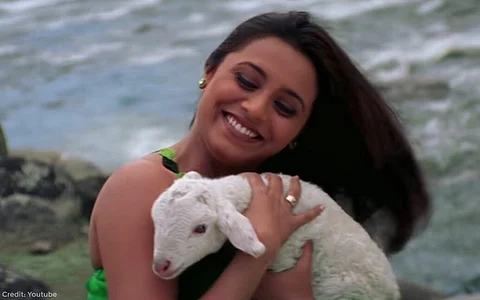
- In-Depth Stories
- Web Stories
- Reviews
- News
- FC Lists
- Interviews
- Features
- FC SpecialsFC Specials

Two decades ago, romantic films in mainstream Hindi cinema were way too escapist to be relatable. Most of them had gorgeous female leads in designer clothes waiting for their Prince Charmings, and they lived happily ever after. I don't think relatable necessarily means no happy ending. In my opinion, you can have a happy ending and still have relatable characters. In the late '90s and early 2000s, much before Jab We Met, Tanu Weds Manu and Band Baaja Baaraat, mainstream romantic Hindi films were reduced to NRI characters and flirty-boy-meets-shy-girl plots. Saathiya, an official remake of Mani Ratnam's Alaipayuthey, came as a breath of fresh air. Unlike OK Jaanu, this remake is a good one. It feels authentic. Saathiya, directed by Shaad Ali, is both swooning and realistic. One of the main reasons for this authenticity is the film's female lead, Suhani (Rani Mukerji).
Also read: Karthik and Shakthi, 20 Years After Alaipayuthey
Suhani lives with her parents and an elder sister in a small apartment in a railway colony. The first fifteen to twenty minutes of the film establish that Suhani belongs to a regular middle-class family. She has petty fights with her mother over eating breakfast, studying and getting good grades in exams. Like any other college student, she uses public transport. She wears regular clothes like salwar-kameezes, skirts and jeans. Sometimes she wears a pair of small earrings and bangles as accessories. She is no fashionista but she likes dressing up a little before leaving the house, like any regular girl. Everything about her feels regular, be it the way she drapes her saree or the way she ties her hair or the little snippet of her playing antakshari while travelling on local trains and cards with her parents back home. Her bare-minimum makeup and not-concealed dark spots are a sign of her confidence.
When Aditya says "I love you" to her, she replies "Woh kya hota hai?". When Aditya says, "Main tumhare liye sab chhod doonga", she replies "Aaj tum mere liye sab chhod doge, kal kya guarantee hai ki tum kisi aur ke liye mujhe naheen chhod doge?" She is practical and determined. She is studying medicine and is also preparing for her master's, therefore when Aditya proposes to her, she does not pay heed to him, although she is attracted to him. Love gets in the way and she decides to get married to him. Suhani is no damsel in distress. She takes her own decisions, whether it's rejecting Aditya's proposal or getting married to him. In both cases, the decision is hers.
Suhani is new to both marriage and work, therefore, when the honeymoon period is over and her internship gets hectic, she becomes frustrated. She is suddenly thrown into responsibilities that she was not prepared for. Her father's death and her guilt at not seeing him one last time adds to her misery. She is both heartbroken and guilt-ridden. Her fights with Aditya never seem to end, whether it's suspecting that he is having an affair or taunting him in front of their friends. She becomes her most vulnerable self. A happy-go-lucky and headstrong Suhani begins to lose herself.
The film is not about Suhani only; rather, it is about a young couple in love. It is not a woman-led film; it is just a film. When we talk about representation of women in cinema, it should not be limited to whether the leading lady is the protagonist or whether she is on the posters. A more appropriate measure of representation is determined by how the woman's character is treated in the film, whether she is the protagonist or the antagonist. Representation means giving her depth and dimension, acknowledging both her strengths and her weakness, and not merely using her as a tool to draw in more people into the theatres. Mani Ratnam's story and screenplay takes us through the ups and downs in Suhani's life. We see both her confidence and her vulnerability. Rani Mukerji plays the character with an effortless charm and sincerity. In Suhani, one finds oneself.